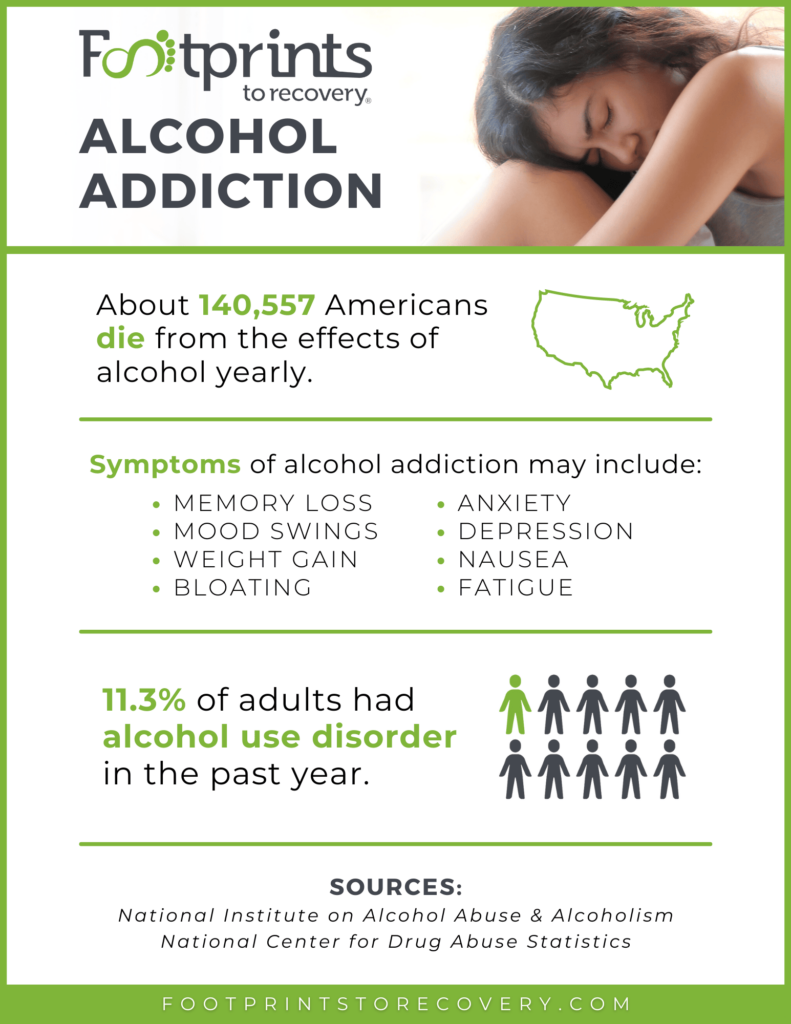If you’re looking for alcohol rehab, you aren’t alone. Alcohol is one of the most widely used substances. According to data from the National Institute on Alcohol Abuse and Alcoholism, more than 219 million Americans age 12 and older have tried alcohol at least once. The same research found that around 60 million Americans over the age of 12 engaged in binge drinking in the past month. The recent pandemic also posed a problem: Sixty percent of Americans said they increased how much alcohol they drank during the shutdowns.
Widespread use means many people don’t see their drinking as a problem. It can sometimes take a serious consequence like a DUI arrest for someone to open their eyes and see that they’re abusing alcohol. When you realize that you’re struggling with alcohol abuse, finding an alcohol rehab center suited to your specific needs is the best course of action. Alcohol rehab involves a variety of evidence-based psychotherapy and holistic practices for an integrated approach to recovery. An alcohol addiction treatment provider like Footprints to Recovery has skilled counselors and alcohol treatment programs like inpatient rehab you need to stop drinking and move on to a brighter future.
When Do You Need Alcohol Rehab?
Alcoholism is different for everyone. Some people may not experience the consequences of drinking for a long time. Some may see consequences immediately. Knowing when to get help is one of the more challenging aspects of recovery. One of the best ways to understand more about your alcohol use is to step back and tally the negative consequences. If you are seeing problems in certain areas of your life due to drinking, they may be signs you are struggling with an alcohol use disorder.
Here are a few common examples that point to a person needing alcohol rehab:
- You use alcohol in the mornings to cure hangovers or stave off withdrawal symptoms.
- You’re performing poorly at work or in school due to drinking.
- You use alcohol for stress relief.
- You’ve built a tolerance to alcohol.
- You feel cravings for alcohol or look forward to drinking.
- You use alcohol as an excuse to attend functions or social gatherings.
Not everyone who experiences these negative consequences may suffer from alcoholism. Working with an alcohol rehab center is a great way to learn more about what alcoholism is and how it’s treated. The team at Footprints to Recovery can help you identify a drinking problem using the latest diagnostic criteria. Then we’ll design a unique alcohol recovery treatment plan suited to your needs. Personalized treatment increases the chances of sobriety and long-term health and wellness.
Self-Assessment: Am I Addicted?
"*" indicates required fields
Why You Should Seek Alcohol Addiction Treatment
Getting help for alcohol abuse is the smartest thing you can do to improve your life. Addiction threatens your health, your happiness, and everything in between. You may find that drinking causes negative consequences in nearly every aspect of your life: relationship issues, financial problems, issues with mental well-being, and isolation from the world around you. It can also be a major impediment to success in areas of life like work or school.
It’s also important to consider the significant health issues alcohol can cause, such as:
- Liver disease
- Heart problems
- Weakened immune system
- Gastrointestinal issues
- An increased risk of accidents and injuries
Addressing alcohol dependence can help improve your overall health and reduce the physical, mental, and emotional risks of alcoholism. Data shows that excessive drinking caused more than 140,000 deaths in the 4-year period from 2015 to 2019. Ending a drinking problem now can prevent you from being a statistic in the future.
What Is Alcohol Addiction Treatment Like?
Alcohol rehab isn’t a punishment. It’s a place where anyone can turn their life around in safety and comfort. If you’re ready to get control over your drinking, the team at Footprints to Recovery is here to guide you through each step of the alcohol addiction treatment process. Our clinical staff offers unparalleled support as you take steps to brighten your future.
Here’s what you can expect when you attend alcohol addiction treatment:
Licensed Staff
The clinical team at Footprints to Recovery is fully licensed and accredited to provide addiction treatment services. Each step of the recovery process is overseen by members of our team so you can put all your focus on recovery. It’s always better to attempt recovery with a team of dedicated and knowledgeable treatment therapists at your side.
Safe and Comfortable Facility
Footprints to Recovery provides addiction treatment at our safe and comfortable recovery centers. The goal of recovery is to help you move past addiction. To do that, you need to feel as secure as possible as you make changes to your life. Our facility offers a safe, home-like setting where you can feel welcome and accepted throughout your time in recovery.
Evidence-Based and Holistic Treatment Options
Footprints to Recovery offers a variety of alcohol addiction treatment options. We provide both evidence-based behavioral therapies and holistic recovery practices for an integrated approach. Our programs are overseen by our clinical staff and proven effective in treating substance use disorders.
The Steps of Alcohol Addiction Recovery
Recovering from alcohol abuse is possible when you get help from a certified and experienced addiction treatment counselor. Recovery isn’t something that happens overnight. The time alcohol rehab takes depends on factors like:
- How long you have abused alcohol
- Your history of recovery attempts
- Any co-occurring mental health disorders
At Footprints to Recovery we provide unparalleled levels of care throughout the process. Here are the steps you may take on your journey to sobriety at Footprints to Recovery:
Consultation
The first step is to contact a treatment center like Footprints to Recovery to schedule an initial consultation with our admissions team. This consultation will involve speaking with one of our skilled clinicians. Your clinician will ask general questions about your life, and they’ll wan to know about:
- Your history of alcohol and drug use
- Your medical history
- Any other factors that could have led to the development of an alcohol use disorder
Unique Treatment Plan
Once you’ve met with a therapist for your initial consultation, the next step is to diagnose any co-occurring substance abuse and mental health disorders and create a unique treatment plan based on your individual needs. Your treatment plan is focused on what you need to heal. There is no one-size-fits-all approach to treatment at Footprints to Recovery. We take the time to learn about our clients in order to meet their every need in recovery.
Detox
Medically supervised detox is often part of an alcohol use disorder treatment plan. Alcohol is a physically addictive substance, and quitting cold turkey can lead to uncomfortable and potentially dangerous alcohol withdrawal symptoms. Footprints to Recovery offers detox at our safe and comfortable facility. The program is overseen by clinical professionals who have helped countless others end their addictions to alcohol once and for all.
Levels of Care
Following detox, many choose to enter a treatment program. These programs can be inpatient, meaning you spend a period of time living at a treatment center and undergoing therapy daily. There are also outpatient options that afford more flexibility if you have obligations like work, school, or family. Some people work their way through each level of care until they’re ready to walk out of treatment with sobriety, accomplishment, and pride.
Therapies
Therapy techniques play a crucial role in treating alcoholism by addressing the underlying psychological, emotional, and behavioral aspects of addiction. Different therapy approaches are used to help you understand your addiction, develop coping skills, manage triggers, and maintain long-term sobriety.
Individual and group therapy sessions are central to alcohol rehab. Footprints to Recovery also uses various therapy approaches, such as cognitive behavioral therapy (CBT), motivational interviewing, dialectical behavior therapy (DBT), and family therapy in our treatment programs. If you suffer from co-occurring mental health disorders, our integrated treatment approach addresses both addiction and mental health issues.
Aftercare
After completing alcohol rehab, aftercare is a crucial phase of maintaining sobriety and preventing relapse. Aftercare programs provide ongoing support, guidance, and resources to people who have completed formal treatment.
Your continued sobriety after leaving our care is a top priority. The therapists at Footprints to Recovery work with clients to create unique aftercare plans. Your plan will outline strategies and resources for maintaining sobriety once you leave our rehab facility. It may include ongoing therapy, finding a sober living situation, support groups, 12-step programs, and more. Staying engaged in aftercare activities and utilizing available resources can significantly increase the likelihood of long-term sobriety and successful recovery.

Inpatient vs. Outpatient Alcohol Rehab
Inpatient and outpatient alcohol treatment are two different approaches to alcohol addiction, each with its own advantages and disadvantages.
Inpatient Alcohol Rehab
Inpatient care provides 24/7 supervision and support, ensuring a controlled and alcohol-free environment during the critical early stages of recovery. It follows a structured routine that includes therapy sessions, group activities, and various treatments. This structure can help you establish new routines and habits. Being away from the outside world and daily stressors allows you to fully focus on your recovery without distractions. Inpatient facilities can provide medical detoxification and immediate medical attention if needed.
Inpatient rehab often requires a more extended time commitment, ranging from a few weeks to several months, depending on the program.
Outpatient Alcohol Rehab
Outpatient care allows you to maintain your daily routines, responsibilities, and connections to family and work while receiving treatment. Outpatient treatment is generally more cost-effective than inpatient rehab because it doesn’t involve accommodations and other residential costs. Outpatient programs offer group therapy and support sessions. These provide a sense of community and accountability. Outpatient treatment is often a step down from inpatient care, providing ongoing support as you transition back to your regular life.
Outpatient rehab typically involves fewer therapy hours and less intensive support compared to an inpatient program. This might not be insufficient for individuals with severe addictions.
How Long Is Alcohol Addiction Recovery?
Recovery is different for everyone, so there is no set timeline for alcohol addiction treatment. Inpatient or residential rehab programs last between 28 days to several months. The duration varies based on the program’s philosophy, your progress in treatment, and your insurance coverage. Some people with co-occurring disorders or other complicating factors stay for longer.
After inpatient care you may step down to a less-intensive outpatient program. Outpatient programs offer more flexibility. They can range from a few weeks to several months. The frequency and length of sessions depend on your needs and the program’s structure. Some outpatient programs offer intensive schedules with daily sessions, while others may have sessions a few times per week.
The addiction recovery timeline can vary depending on factors like:
- How long you’ve abused alcohol
- How much alcohol you consume
- If you’ve tried to reach sobriety before
The time it takes for you to recover from alcohol addiction is something an addiction treatment counselor can help you with. Footprints to Recovery offers different levels of care and treatment options for a personalized approach to recovery. A consultation with our admissions team can give you more information about your possible addiction treatment timeline.
For most people, sobriety is a lifelong process that requires regular care and maintenance. The team at Footprints to Recovery has resources dedicated to continuing care long after you’re finished with formal treatment. Our goal is to put you in position to succeed long after you leave our doors.

What Is Dual Diagnosis Treatment?
There are many reasons people develop alcohol use disorder (AUD). One of the most common is mental illness. Mental health disorders have been proven to make substance abuse issues worse as they can perpetuate symptoms. When you’re struggling with your mental health and alcohol abuse, dual diagnosis treatment is the best option.
Dual diagnosis, also known as co-occurring disorders, refers to the presence of both a substance use disorder and a mental health disorder at the same time.
Some common mental health disorders that dual diagnosis treatment can help with are:
- Depression
- Anxiety
- Bipolar disorder
- Schizophrenia
- Post-traumatic stress disorder (PTSD)
Dual diagnosis is a complex and challenging situation because both the substance use disorder and the mental health disorder can interact and exacerbate each other. For example, alcohol abuse can worsen the symptoms of a mental health disorder, and vice versa. The presence of a mental health disorder can also complicate treatment for alcoholism and make recovery more difficult. This is another reason professional alcohol treatment is the best way to make your future as bright as possible.

Alcohol Rehab at Footprints to Recovery
At Footprints to Recovery our goal is to help you end alcohol addiction once and for all. Our treatment approach helps you develop life skills and healthy habits you can take with you when you leave our rehab facility. Our unique levels of care for alcoholism treatment offer a real chance at overcoming a drinking problem. Those levels of care for alcoholism include:
- Medical detox: Your recovery journey can’t begin without detoxing from alcohol completely. In medical detox our medical team can help manage your alcohol withdrawal symptoms and make the process safe and comfortable before you move on to the next level of care.
- Inpatient treatment: Inpatient rehab is an option for alcohol treatment after detox. Residential treatment involves spending 24/7 at one of our drug and alcohol addiction centers. Our counselors oversee the treatment process so you can focus all your efforts on reaching sobriety.
- Partial hospitalization program (PHP): A PHP is a form of outpatient treatment that involves attending treatment at our recovery center up to five days per week. The rest of the time, you live at home or in a sober living residence. The goal is to begin the transition from recovery back to normal life free from alcohol addiction.
- Intensive outpatient program (IOP): An IOP is another form of outpatient treatment that is an option for alcohol treatment. You spend between 9 and 15 hours per week in treatment. The rest of the time, you live at home or in one of our sober living homes. The goal is to expand upon the tools and skills learned in previous levels of care.
- Outpatient program (OP): Outpatient rehab for alcohol is only once or twice per week. The goal is to use the tools and skills learned in addiction therapy to overcome alcohol use disorder treatment and remain sober long-term.
Footprints to Recovery offers a full continuum of care for alcoholism at our treatment facilities. Working with licensed treatment centers and their staff is always a better option than trying to overcome a substance use disorder on your own. Our behavioral health professionals can assist with co-occurring disorders so you can get your quality of life back. Contact our admissions team today for insurance verification or to ask our team members questions about alcohol rehab. An inability to pay for treatment shouldn’t deter you from getting help. Our team can verify your insurance or outline the other payment options.
Not all addiction treatment centers are the same. Footprints to Recovery is dedicated to quality care. Call our team today and leave alcohol abuse in the past.
Questions about treatment options?
Our admissions team is available 24/7 to listen to your story and help you get started with the next steps.



